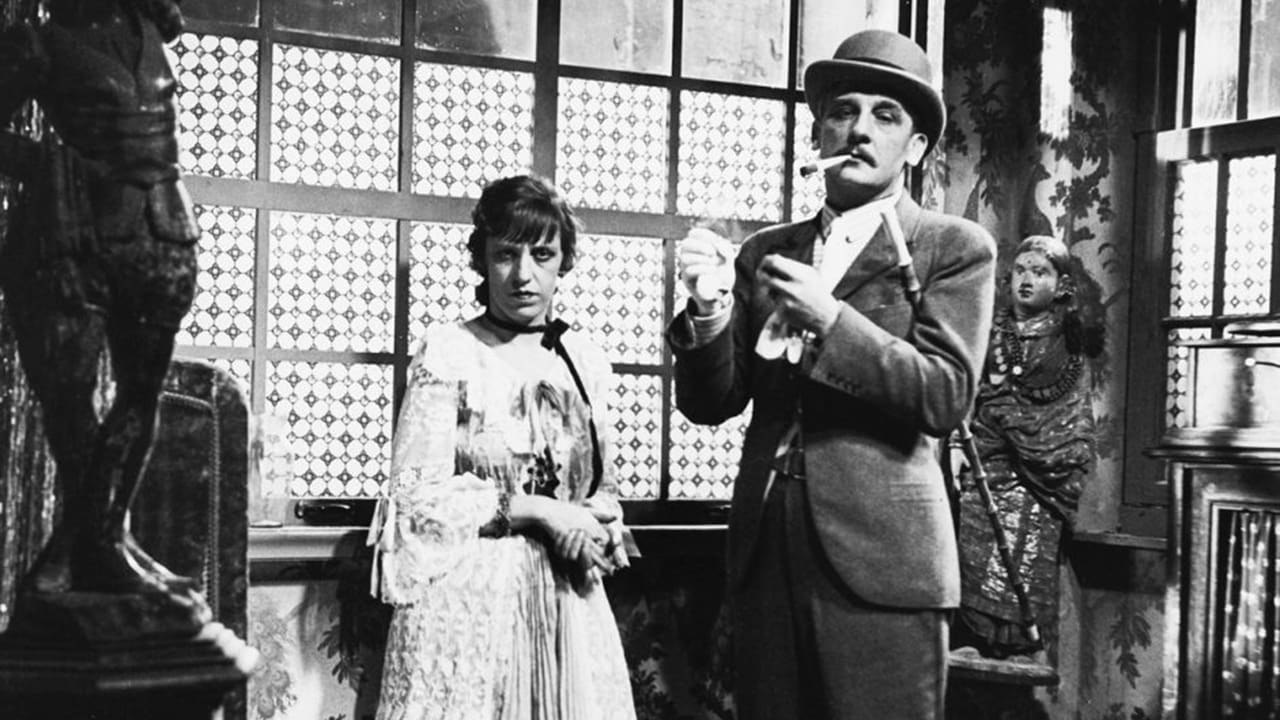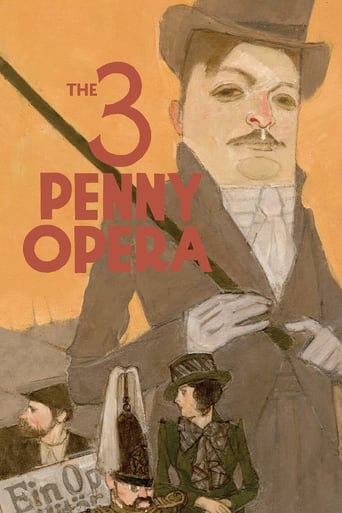

This movie feels like it was made purely to piss off people who want good shows
... View MoreThere are moments that feel comical, some horrific, and some downright inspiring but the tonal shifts hardly matter as the end results come to a film that's perfect for this time.
... View MoreThe story, direction, characters, and writing/dialogue is akin to taking a tranquilizer shot to the neck, but everything else was so well done.
... View MoreThere's a more than satisfactory amount of boom-boom in the movie's trim running time.
... View MoreIn London at the turn of the century, the bandit Mack the Knife marries Polly without the knowledge of her father, Peachum, the 'king of the beggars'.This film strikes me as being very much in the same world as "M". We have some criminal alliances, a whole world underground, and some shady characters. No child murderers, but still. And apparently it was even supposed to star peter Lorre at some point, which would only have increased the connection.I am not familiar with the play, but this film is excellent and really cements Pabst's reputation. I could probably take or leave the songs, but this is an "opera" after all.
... View MoreI've read the reviews of this film so far with a lot of interest. I found this version of "The Threepenny Opera" to be well worth seeing multiple times. It has a great cast, a complex script and is heroic in some ways while not so heroic in its ending.The sell-out ending, a preposterous twist where Polly, temporarily at the head of her husband Macheath's gang, manages somehow for them to buy a bank; and she, Macheath and her 'king of beggars' father all wind up extolling the virtues of feeding off the poor with said bank is hard to stomach for leftist revolutionaries. We can only assume the production was under pressure while it made this film in Berlin during the rise of the Nazis.I loved it visually. The cast is exceptional. While I've read everyone's comments about Lotte Lenya's 'Pirate Jenny', I adored Carol Neher's lone song even more. In my view, Neher (as Polly) breaking out in song at her wedding reception, when we know nothing about her character thus far, is the highlight of the film.(When we learn what a terrible life she lived after this movie was released one can really appreciate Carola Neher's performance. She must have been an incredible person to work with on a film, particularly during such a time as 1931's Berlin.) Overall, Pabst's 'Threepenny' isn't perfect. Still, I recommend it highly. It should be seen by film fans looking to be floored by early sound-era performances that have been criminally forgotten today.
... View MoreYou have to appreciate this is from a time when a battle was being fought over the soul of Germany from the streets to the screen. That was true when Brecht wrote the play, and even more so three years later in this film incarnation. On one side you had Pabst, socially-conscious, humanist, and on the opposite end Riefenstahl's visions of mystical , sensuous and heaven-defying purity (and all that prefigures).And I write this from a country that experiences an eerily similar situation almost a century later, is ravaged by recession, well-to-do people of three years ago are now sleeping in benches, and that horror and despair has brought actual neo-Nazis in the parliament and racial hate in the streets. So, this hits unexpectedly close to home, and makes me lament that we don't have talents of Pabst's calibre.Ingenious moments in this extremely cynical vision of a world ruled by money include a 'king of beggars' who runs a powerful beggar-union of fake beggars, and a crook who is sprung from prison only to discover he is president of a London bank.Pabst plays free and loose with Brecht's text, drops several musical numbers, and makes at least two powerful additions of his own: his ire is aimed at both left and right, with the beggar-union clearly standing in for socialists (their slogans include "give to be given back") who exploit the despair of the people for petty gains, and goes on to show a public riot (only threatened in Brecht) that ends not in triumphant Soviet-revolution but failure and obscurity.The guy (with his team of close collaborators) was a genius, just not necessarily in this field. Individual scenes are superb, but the whole feels sluggish and protracted. Scenes open several moments before we need the information and end several moments later. And for a film like this, you need a Marx Bros - Dr. Strangelove madcap rhythm to keep the zap of ferocious energy from dissipating.But you just need to look at the opening to see what these guys were capable of, what astounding visual language they had refined.The sparsity works because they're not going for comedic effect yet. It could be the opening to any type of film, say a melodrama. We are introduced to our crook through a public show in the Italian manner, sung and pointing to illustrated panels of the action (our film), and go on to meet him as he courts and swiftly convinces a young girl to marriage. All of that happens in a matter of minutes, no more than four scenes tops. There is a minimum of dialogue. The courting - a dance of seduction - happens in a dance club, and is actually shown as other couples dancing. We don't hear what he says to her, only lips moving. We only find out later (maybe) when she sings about it.Pabst was the master of allusive filmmaking in the late silent era. You just can't afford to miss his Diary of a Lost Girl.These days, Eisenstein is the backbone of MTV. You can see Riefenstahl's mark all over the coverage of sports and public events. Expressionism has been made cute and pop. Unlike them, this mode of using a scene to portray unseen bits of narrative that would have been wholly ordinary if simply shown is still new and untapped.
... View MoreThis adaptation of Brecht/Weill's Musikspiel is considered by many a classic masterpiece. Classic it may be (and as such historically important), but a masterpiece it is not. I am not interested in the changes vis-a vis the play: recent research has found out that most changes were already proposed by Brecht himself and other research has found out that Brecht was not the writer at all, but Elisabeth Hauptmann. Nor am I interested in the fact that Weill's music is reduced and that not all songs are performed, which was unavoidable.The point is that although there was real potential for a masterpiece (set designer, cast, director, cameraman etc.), Pabst never succeeds in making this adaptation into a real filmic adaptation. Scenes are presented in order, but never there is a feeling of a close and tightly held drama; the film is more or less subdivided. This may have been on purpose (considering the structure of the play), but for me it just does not work as film. It seems if no real choice was made between a documentation of the play or a truly filmic adaptation; what we are left with is something that lies in between, and that never comes alive. Are we seeing the result of all the (judicial) troubles director and writers had with Brecht and Weill? Or were the makers just too involved in making a masterpiece?So, is this a mediocre or even bad picture? Certainly not. Individual scenes are fine due to sets and cast and the way in which Wagner and Pabst know how to use them (no room here to analyze this). But, on the other hand: do we really see or feel a menacing threat from the army of beggars? Do we really need Ernst Busch as the street singer?; do his scenes really add something? And are most songs not just registered as if they were performed on a stage? And is the editing not just adequate?Today was my 5th or 6th viewing. I still cannot see why this film ever could be acclaimed a masterpiece.
... View More